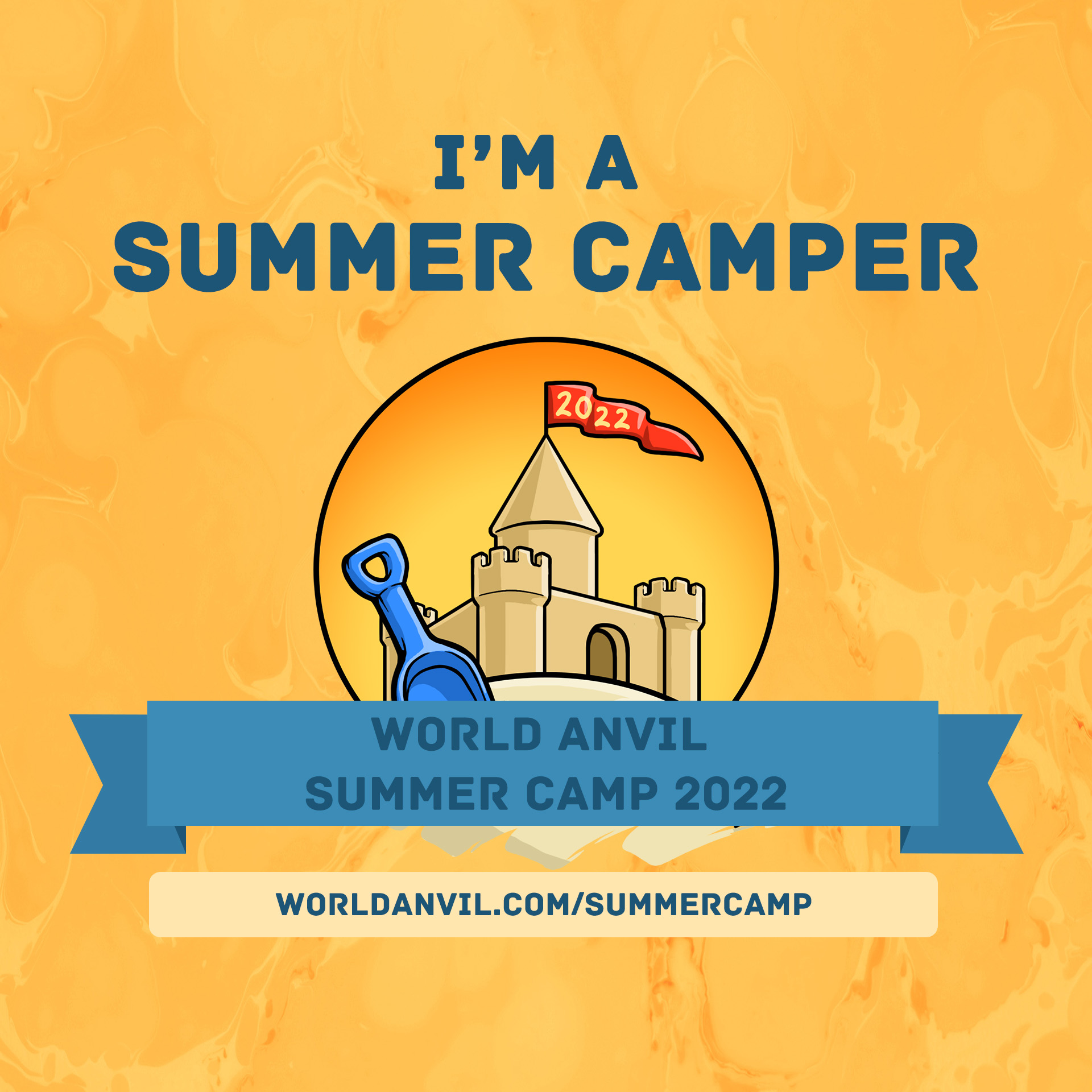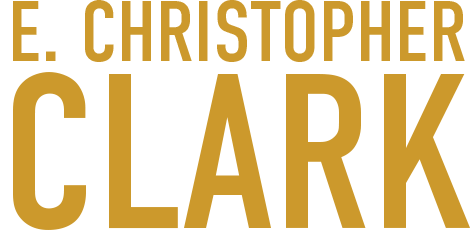Reading Challenge: Summer Camp 2022
The first rule of Becoming a Writer™ is that you must write a lot. The second rule is that you must read a lot—and, preferably, that you read both deeply in your area of concentration and widely so that your writing doesn’t end up sounding generic and/or derivative.
That is, if you want to write the next Lord of the Rings, you can’t read only Tolkienesque fantasies. As Neil Gaiman tells us in his interview with The Nerdist Podcast, “Tolkien didn’t read big Tolkienesque fantasies; he read books on Finnish philology.”
This is why the Reading Challenges which follow most of World Anvil’s big writing events these days are some of my favorite challenges of all. I get to refill my tank, as it were, with inspiration from the hundreds and thousands of writers who surround me.
The Reading Challenge for Summer Camp 2022 is to choose three Summer Camp prompts and to read three articles submitted in response to each those prompts. But me, rulebreaker that I am, remembered that there were four Summer Camp themes this year, not three, and I didn’t want any of the themes to feel left out.
And so, I have chosen four Summer Camp prompts instead—one from each theme—and read three articles submitted to each prompt.
Prompt: A religion or organisation connected to a natural phenomenon
Emily’s article is chock-full of baking puns, yes—and I do very much love those—but I think my favorite thing about this article is that it reminds me to try and keep the text more simple and straightforward next time, and to plan art & design into my articles from the start. One thing I was sad about this Summer Camp was how little art I produced for my world. Emily’s article is a great example on how one might do that.
The idea of a group worshipping the Aurora Borealis as divine is perfect, and not something I ever would have thought of. This one really inspires me to look deeper into my options when responding to prompts. I had a lot of fun coming up with ideas as quick as I could this year, but I think there are times I could’ve stood to give each prompt a little more breathing room so that maybe I might’ve come up with something less obvious (less obvious to me, at least).
As a rule, I skip right past introductory quotes in World Anvil articles—especially long ones. And yet, the presence of the phrase “I never cared much for alcohol” at the start of an article about Brewmasters was just enough juxtaposition to get me to read the opening quote here. Just goes to show me that even techniques I would normally never use myself can be fantastic in the right context. I also really love the addition of a section here on how this group relates to others in the world. That reminded me of one of my first challenges as part of the WA community, the Alliance Challenge, where connecting one org with others was the whole point.
Prompt: A tradition or ceremony which confers an honor on someone
I was reminded, here with Laura’s article, of the power of a simple, clear title. “The Hatting” not only grabbed my attention but let me know exactly what I was in for. And the text that follows didn’t disappoint. By the end, I both understood the specifics of the ceremony and got a few juicy morsels of information about the rest of the world.
While some aspects of “Ascension to Motherhood” could be clarified—for instance: does serving the Pharoah and his Queen grant a cure for infertility in the end?—the backstory that leads into the description of the ceremony (plus the gorgeous images that go with it) reminded me of the power of great description to heighten the importance of what follows. The ceremony here could have been about toasting a morning bagel and I would’ve seen it as awe-inspiring, given the story that came before it.
The further into this article you go, the more it starts to feel like a story and not just a worldbuilding reference article. Reading this reminded me to try and be a little less academic with my worldbuilding prose, which tends to follow the Wikipedia/Encyclopedia model. I am a fiction writer, after all—and an occasional poet—so why shouldn’t my stuff read a bit more like a story, the way that Dazz’s article does here.
Prompt: A lost or discovered monument
The Throne of Broken kings is “a walking throne made up of dead bodies.” What more could you want out of lost monument? I mean, jeeze, this is both horrifying and absurd—so out there, in fact, that I totally believe it. And so, reading this reminded me of my favorite kind of horror—the kind of horror that is so overwhelmingly beyond human comprehension that you don't know whether to laugh or scream.
But you always end up screaming at some point.
The thing about Qurilion’s work is that, if the writing doesn’t grab you right out of the gate (though it usually will) then the art will keep you around for long enough that you can’t break free from the article’s vise grip on your imagination. This piece, “The Skein-Spiral Gates,” is a perfect example of that. After one glance at that cover image, there’s no way I’m going to stop reading this until I reach the end. And that reminded me of the power of art to hook a reader—making me all the more sad, for a moment, that I didn’t get to include much art with my articles this Summer Camp.
The Arch of Harmony is a monument of peace and friendship, and I was so pleasantly surprised to find this article that I had to include it here. I don’t know why, given that I live in the United States and that one of our most famous monuments (the Statue of Liberty) is essentially of this sort, but I never even considered worldbuilding a monument to something happy. Ninne124’s article reminded me to not rush too quickly through the idea generation process the next time I’m presented with a prompt like this. If we take our time, we might just come up with something worth our time—and the time of others—just like “The Arch of Harmony.”
Prompt: An artifact that embodies a hideous or monstrous idea
Valentine’s Statue, which is “proof that the elves are more sentimental than they seem,” is introduced to use here through a pair of conflicting quotes—one from the “Instructor of Recruits” and another from the wonderfully named Sgt. Kill Flayer. This technique of Kitoypoy’s is fabulous and one I want to emulate at some point. As I’ve already said above, I tend to skip over quotes at the beginning of articles, but Kit’s strategy of using two contrasting bits of dialogue always catches my attention.
This one has night hags and heartstones and is just a darn good yarn, but my favorite bit about this piece is super nerdy. My favorite bit is that Bob holds my attention in the Physical Description section, even though I as the reader want to skip ahead and learn more about the story teased in the introduction. That’s a real skill, and worth developing. In fact, there’s a writing exercise I give to my students each year where they’re asked to write the paragraph right before the discovery of a body—the task being to build tension that makes the reader want to skip ahead, but to use such compelling language that you don’t let them skip even a word.
Short and to the point, this article conveys a haunting concept—trigger warning: self-harm and suicide—but does so in a way that doesn’t overburden the reader. You can feel the horror that must go into creating and using an object like this, but the author is wise enough to keep from belaboring the point. I really admire this approach and will seek to do similar things with my own descriptions of unpleasantries in the future.
Future Goals (Based on My Reading)
I have a couple goals in mind after completing this challenge:
- Make time for art. I really missed not having time for art this Summer Camp, and reading many of these articles reinforced that. While I had good reason for not arting as hard as I did last year (I was engaged in a singing competition all month), I think next year I will make a concerted effort to keep my month more free for art.
- Keep reading as a writer. Reading as a writer is a skill I developed in graduate school and one that I use often while reading books or watching movies and TV shows. I haven’t really, until now, applied that skill to my reading of worldbuilding. But I definitely see the value in it after this challenge.
And that’s that. Congratulations if you made it this far. You win a gold star. Now grab your hammer, read a few articles yourself, and then go worldbuild!





Confession, I sometimes skip over these and don't read all the commentary, but I read all of yours! Thanks for pointing out some good reading material for all of us! (And thanks for including my article! )
Learn about the World of Wizard's Peak.
Same here. I'm glad you got a kick out of this one, though—especially with how long-winded I can get at times.